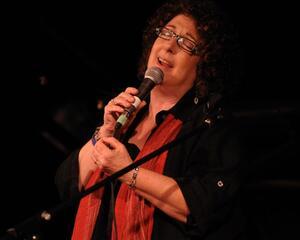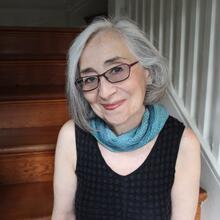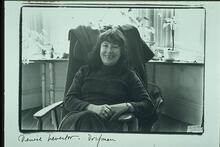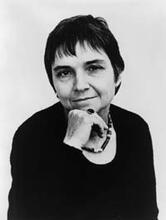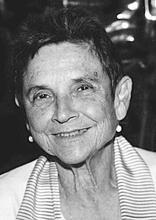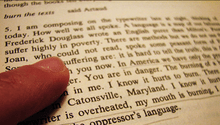Adrienne Cooper
A versatile performer, scholar, administrator, and activist who worked in the fields of Yiddish culture, Jewish music, social justice, and feminism, Adrienne Cooper inspired international audiences with her compelling performances and nurtured a generation of musicians, academics, and advocates. Cooper held influential administrative positions at several cultural institutions in New York City, including the YIVO Institute and the Workmen’s Circle. Best known as a vocalist, she appeared in concert and on stage internationally, recorded extensively, and also mentored a generation of singers in the art of Yiddish song. Cooper’s artistry was bound up with her dedication to feminism and social justice, reflected in her many cultural endeavors.
A versatile performer, scholar, administrator, and activist who worked in the fields of Yiddish culture, Jewish music, social justice, and feminism, Adrienne Cooper inspired international audiences with her compelling performances and nurtured a generation of musicians, academics, and advocates. The daughter of Emmanuel and Buni (née Barach) Cooper, both of whom were the children of immigrants from Eastern Europe to North America, Adrienne Cooper was born on September 1, 1946, in Oakland, California. Her ancestors include several vocal musicians: her maternal grandmother, Sarah Barach, sang traditional Russian and Yiddish songs, accompanying herself on the mandolin; Cooper’s grandfather Shabtai Barach, an accomplished performer of cantorial music, long served as a leader of worship in synagogues. Buni Cooper studied voice at the Juilliard School in New York. She performed in operas and musicals in New York, Chicago, and San Francisco and appeared frequently in recitals of Hebrew and Yiddish songs in the Bay Area. From 1976 to 1986, Adrienne Cooper was married to Cantor Jonathan Gordon. Their daughter, Sarah Gordon, is a musician, educator, and cultural activist in her own right. Cooper was also in a long-term relationship with pianist and composer Marilyn Lerner. Cooper died on December 25, 2011, in New York City.
Education
Cooper began her undergraduate studies at the University of California in the mid-1960s and received her BA degree from Hebrew University in Jerusalem ca. 1970. She subsequently pursued a graduate degree in History at the University of Chicago, earning her MA in the early 1970s and concluding her studies as an ABD (All But Dissertation) in 1976. Cooper studied voice at the Rubin Academy in Jerusalem and with vocal coaches Sonia Sharnova and Thom Wikman in Chicago, as well as with Antonia Lavanne and Marcy Lindheimer in New York. In 1975, Cooper traveled to New York for a dissertation fellowship at the YIVO Institute for Jewish Research, to study the work of Yiddish poets in New York. This proved to be a transformative move. As a result of her encounters with the circle of Yiddish writers, composers, and activists in this milieu, Cooper decided not to finish her doctorate and, as she often explained, rather than only study the history of Yiddish culture, to become an active participant in it as well.
Administrator
Cooper held influential administrative positions at several cultural institutions in New York City. From 1980 to 1990, she was the Assistant Director of the YIVO Institute. There her responsibilities included overseeing the Max Weinreich Center for Advanced Jewish Studies, an interdisciplinary program that offered graduate courses and ran scholarly conferences and other activities, all of which supported the study of Yiddish-speaking Jewry and related topics. While at YIVO, Cooper also helped establish the Yiddish Folk Arts Program, informally known as Klez Kamp. This pioneering program, inaugurated in 1985, fostered the study and performance of instrumental and vocal music as well as other aspects of Yiddish culture. Cooper then served as the Program Director of the Museum of Chinese in the Americas from 1990 to 1998 and as Executive Officer for Programming and External Affairs for the Workmen’s Circle from 2001 until her death. There Cooper initiated the creation of its Activist Hagodeh and worked on reconfiguring the Workmen’s Circle communal seder as a more overtly political celebration.
Musician
Cooper may be best known as a vocalist, widely acclaimed for her emotionally charged and intellectually probing approach to Yiddish song. She appeared in concert internationally, including major venues in the United States (Carnegie Hall), Canada (the Ashkenaz Festival in Toronto), and Europe (the Concertgebouw, Amsterdam). Cooper was a regular presence at performances of Jewish music in Eastern Europe (including the Singer Festival in Warsaw, the St. Petersburg Klezfest, and the Kiev Klezmer Festival) and performed at several Holocaust memorial programs, including at the United States Holocaust Memorial Museum in Washington, DC, and the Jewish Museum in New York. Her performances in music dramas include Songs of Paradise, based on Itzik Manger’s poems about biblical figures, initially presented at Joseph Papp’s New York Shakespeare Festival / Public Theater in New York, and the title role in The Memoir of Glikl of Hameln / Zikhroynes Glikl, a music theater piece that she created in collaboration with performance artist Jenny Romaine and musician Frank London. Following its premiere in Toronto in 1997, the production played at the La Mama Annex in New York and toured internationally. Cooper’s other collaborations include the concert “Esn: Songs from the Kitchen,” with musicians Lorin Sklamberg and Frank London; “Every Mother’s Son: Jewish Songs of War and Peacemaking,” a multi-media concert featuring animations by Israeli visual artist Mor Erlich; and a bilingual song cycle, “Shake My Heart Like a Copper Bell: On the Poetry of Anna Margolin,” created with Marilyn Lerner.
Cooper released three solo recordings of Yiddish song: Dreaming in Yiddish, with pianist Joyce Rosenzweig (1995), Ghetto Tango, a collaboration with Zalmen Mlotek (2000), and Enchanted (2010), which features recording of performances by her maternal grandparents and mother that were made by Emmanuel Cooper. Cooper also performed on more than a dozen other albums of Yiddish vocals, ranging from Holocaust music to children’s songs, American Yiddish radio numbers to progressive political anthems. She was interviewed for the documentary films Making Trouble: Three Generations of Funny Jewish Women (2007) and Where Neon Goes to Die (2007), and her singing is featured on the soundtracks of the documentaries Healthy Baby Girl (1997) and Wrestling with Angels: Playwright Tony Kushner (2006).
Cooper’s devotion to Jewish music extended to teaching Yiddish songs to students learning the language at the Uriel Weinreich Program in Yiddish Language, Literature, and Culture, when she was its director in the 1980s. In subsequent years she offered master classes at Jewish music and folk arts programs in New York State and Quebec Province, as well as in Kiev, London, Moscow, St. Petersburg, and Weimar. Her mentoring proved especially important for singers in the former Soviet Union, whom she provided with resources and invaluable insights into the repertoire and performance practices of East European Jewish music. Among the vocalists she mentored are Efim Chorny, Timur Fishel, Susanna Ghergus, Zhenya Lopatnik, Sasha Lurje Polina Shepherd, and Vanya Zhuk.
Cooper was also an astute observer of the rapidly growing and innovating performance culture, centered on Yiddish and klezmer music at the turn of the twenty-first century, in which she played a prominent role. For example, she wrote of her experiences performing at the 1992 Jewish Cultural Festival in Cracow, “The audiences are intelligent, attentive, and very malleable. They respond to everything, participate actively, adapt to each of the diverse performances. For Andy Statman’s trio, they listen with the fixed attention of a jazz audience; for Shlomo Carlebach, they are flower children wannabees; for the Klezmatics—rock and rollers.….. You can feel their effort from the stage” (Cooper, 13).
Activist
Cooper’s artistry was bound up with her dedication to feminism and social justice. Along with literature scholar Evelyn Torton Beck and poets Irena Klepfisz [insert link to new entry on Irena Klepfisz] and Adrienne Rich, Cooper was a member of Di Vilde Chayes (The Wild Animals), a political Jewish feminist group founded in New York in 1980, and she contributed to The Tribe of Dina: A Jewish Women’s Anthology, a landmark collection of Jewish feminist essays, poems, stories, and other writings, published in 1986. Cooper often performed Yiddish songs of the radical Jewish past, exemplified by her participation in the 1998 recording In Love and Struggle: The Musical Legacy of the Jewish Labor Bund, another of her collaborations with Zalmen Mlotek. Other performances in which Cooper appeared were connected to contemporary political concerns, such as “Queer Jewish Weddings,” a concert presented in October 2005 at the Miles Nadal Jewish Community Center in Toronto to mark the legalization of same-sex marriage in Canada. While at the Workmen’s Circle, she worked with Jews for Racial and Economic Justice to stage politically charged Holiday held on the 14th day of the Hebrew month of Adar (on the 15th day in Jerusalem) to commemorate the deliverance of the Jewish people in the Persian empire from a plot to eradicate them.Purim plays.
At the same time, Cooper drew thoughtful connections between works of Yiddish culture rooted in the past and issues of the present. She described the theatrical adaptation of Glikl’s seventeenth-century memoir on which she collaborated as a “free telling of a premodern Jewish life that still resonates with issues that we face: the rearing of children, the educating of children, living in the world, making a living, sustaining a relationship, facing mortality” (Novick, 7). Cooper’s extraordinary legacy as an artist, educator, and activist is honored through the Adrienne Cooper Fund for Dreaming in Yiddish, which awards prizes annually to performers and cultural activists committed to furthering Yiddish culture.
Cooper, Adrienne. “Notes from a Concert Journal.” Jewish Folklore and Ethnology Review 15, no. 1 (1993): 13.
Novick, Julius. “She Had a Head for Business and the Heart of a Writer.” New York Times, January 23, 2000, sec. 2, p. 7.
Wood, Abigail. And We’re All Brothers: Singing in Yiddish in Contemporary North America. London: Routledge, 2016.

